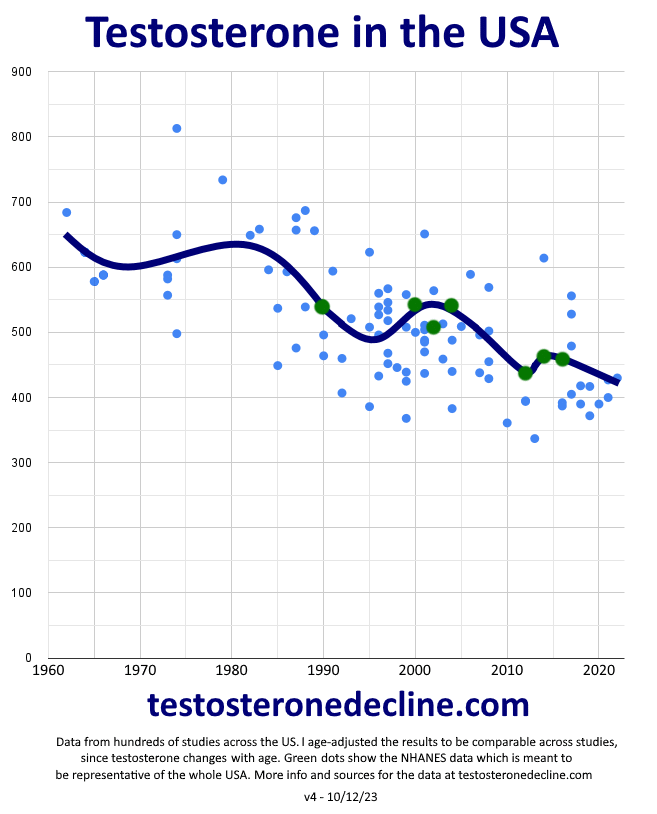Disclaimer: We share our opinion only and none of our content should be considered fact, lawful, legal, or medical advice. Your results are in no way guaranteed and will depend on several factors including your individual circumstances and lifestyle.
Testosterone Decline
Testosterone decline: levels in men have plummeted drastically over the last century. First, discover why and how you can prevent it.
Exposing the Testosterone Epidemic
Critically, an alarming study reveals that men in their 70s during the 1960s had more testosterone than most men do today. To be clear, testosterone levels in men have plummeted drastically over the last century, sparking a widespread health crisis that has quietly grown in severity. In fact, during the 1960s, the average testosterone levels of men hovered around 625 ng/dl. Fast forward to the modern day, and this number has declined to an alarming average of 451 ng/dl—barely above the threshold for clinical low testosterone (300 ng/dl). Likewise, this stark contrast suggests an undeniable shift in male hormonal health.

Fundamentally, environmental factors such as endocrine-disrupting chemicals and fluoride exposure, along with dietary changes, have been implicated in this disturbing trend. Meanwhile, microplastics, seed oils, and other pollutants infiltrate our lives, further compounding the issue. To expound, these shifts have resulted in men of today having significantly less testosterone than their fathers and grandfathers.
Above all, the consequences of this decline are devastating. Indeed, low testosterone levels are closely linked to reduced muscle mass, lower bone density, infertility, diminished libido, and increased risks for depression, metabolic disorders, and cardiovascular disease. Likewise, younger men, in particular, are seeing notable declines, raising concerns about fertility and quality of life for future generations. Alarmingly, with mounting evidence pointing to lifestyle and environmental triggers, it’s time to rethink modern habits to reclaim hormonal health.
Further Reading: Cardio Healthy Foods: The Ultimate Top 4 List
Have We met?

Karen Scalf
cEO
KHFarms is proud to be a female-owned farm as Karen Scalf is the Chief FarmHER and CEO. She handles all of the breeding and management of the cattle herds. When not tending to the cows, visiting the hogs, checking on the chickens, or making sure everyone has something for supper, she sits on the Duplin County Farm Bureau Board of Directors (20+ years and still going!), was the Vice-President of the Duplin County Cattleman's Association, and continues as an agrarian advocate for regenerative farming and building stronger farm families and communities.
Environmental and Lifestyle Factors Contributing to Testosterone Decline
First, a combination of environmental and lifestyle factors is driving the collapse of testosterone levels in men. Among these, fluoride in drinking water has emerged as a key player. To expound, research reveals that fluoride exposure is associated with reduced testosterone production, particularly in younger men aged 18-39. Accordingly, unlike the expected age-related testosterone decline, fluoride appears to directly suppress the body’s ability to produce this crucial hormone. In fact, its long-term accumulation in bone may also disrupt pathways regulating testosterone biosynthesis in older adults.
Common Testosterone Disruptors
In addition to fluoride, endocrine-disrupting chemicals (EDCs) found in everyday items such as plastics, pesticides, and household products further exacerbate this problem. Furthermore, these chemicals interfere with hormonal balance, damaging testosterone production and sperm quality. Moreover, microplastics, which are commonly inhaled through synthetic fabrics like polyester, have been identified as a particularly potent disruptor.

Next, modern dietary trends also play a significant role. Sadly, the widespread consumption of seed oils—cheap vegetable oils used in processed foods—has been linked to hormonal imbalances. These oils often contain omega-6 fatty acids, which promote inflammation and can negatively affect testosterone synthesis. Compounding the issue, commercial farming practices have depleted essential nutrients like zinc and magnesium in our food supply, both of which are critical for hormonal health.
Above all, by addressing these environmental and lifestyle triggers, men can begin to counteract this alarming trend.
The Impact of Low Testosterone on Men’s Health

Critically, the effects of low testosterone on men’s health are profound, extending far beyond reduced libido. To explain, testosterone is a key hormone that supports numerous vital functions in the male body. As a result, its decline has serious implications for physical, reproductive, and mental health.
For example, one of testosterone’s most critical roles is maintaining bone density. Moreover, low levels increase the risk of osteoporosis and bone fractures, which were once considered conditions of older adults but are now appearing in younger populations. In conjunction, muscle mass and strength also depend heavily on testosterone, meaning its decline leads to reduced physical performance and increased body fat.
Likewise, reproductive health is another major concern. Indeed, testosterone is essential for sperm production and overall fertility. In fact, studies show a significant drop in both sperm quality and quantity among men today compared to past generations. Sadly, for younger men, this trend raises the alarm for future fertility rates.
Furthermore, low testosterone levels also impact mental health. For example, depression, fatigue, and poor concentration are strongly linked to hormonal imbalances. Moreover, metabolic disorders like diabetes and obesity are more prevalent in men with diminished testosterone levels, adding to the growing burden of chronic disease.
In summary, addressing this crisis is essential not only for individual well-being but also for the overall health of society.
The Carnivore Diet as a Solution to Testosterone Decline

Further Reading: Grass-Fed Beef: The Surprising Perks of Choosing Local
Fundamentally, one promising solution to combat declining testosterone levels lies in the carnivore diet, which prioritizes naturally sourced beef, organ meats, and other animal-based foods. To expound, this ancestral approach to eating is rich in nutrients that play a pivotal role in hormonal health.
Critically, appropriately raised beef and organ meats are excellent sources of zinc and magnesium, minerals essential for testosterone production. Likewise, these foods are also abundant in vitamin D, a nutrient that supports testosterone synthesis and overall hormonal balance. Indeed, grass-fed beef, in particular, offers higher levels of omega-3 fatty acids, which reduce inflammation and improve cellular function, further supporting hormonal health.
Additionally, organ meats like liver contain high concentrations of vitamin A, which contributes to maintaining testicular health and testosterone regulation. Unlike processed foods loaded with harmful seed oils and synthetic additives, the carnivore diet provides pure, bioavailable nutrition that the body can easily utilize.
To be direct, by adopting a carnivore diet, men can replenish their bodies with the critical building blocks for optimal testosterone production and protect themselves from the harmful effects of modern dietary practices.
Empowering Men to Take Control of Their Health

Further Reading: Healthy Foods for Heart Health: Shocking Myths vs Facts
In short, the testosterone epidemic should be a wake-up call for men everywhere. Indeed, the steady decline in testosterone levels over the last century is not just a statistic—it’s a direct threat to the health, vitality, and fertility of generations to come. From environmental toxins like fluoride and microplastics to poor dietary habits, the factors driving this crisis are clear. But so is the path forward.
Indeed, a carnivore diet rich in naturally sourced beef and organ meats offers a powerful way to restore hormonal balance. By embracing nutrient-dense foods and avoiding processed products, men can reclaim their testosterone levels and improve their overall health. The time to act is now.
Finally, take charge of your health by making informed decisions about your diet and lifestyle. Prioritize whole, nutrient-rich foods, minimize exposure to environmental toxins, and commit to habits that support long-term hormonal well-being. Together, we can reverse the trend and reclaim the strength, energy, and vitality that define a healthy life.
